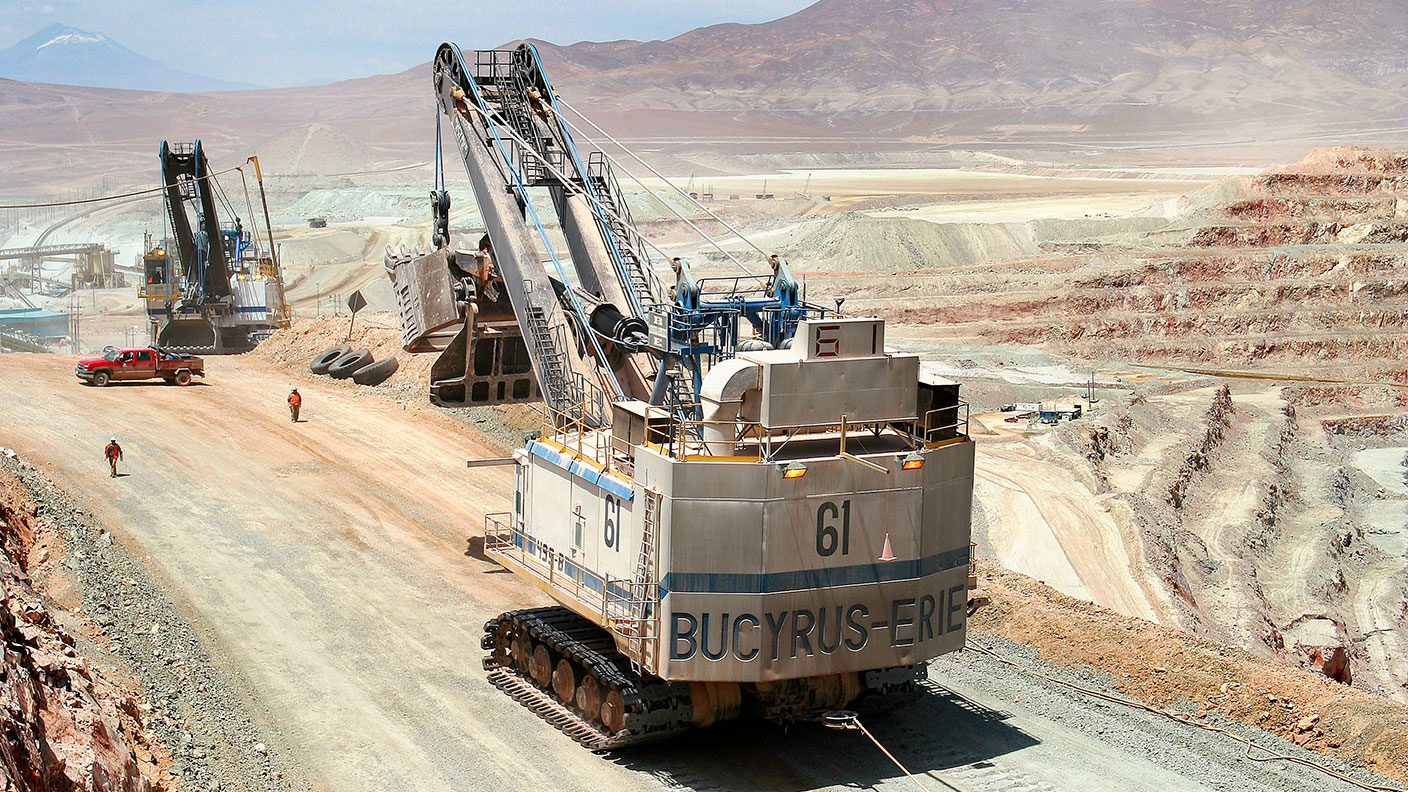The natural resources industry is in a tight spot – which is bad news for the rest of us
The natural resources industry is in a bind. We need it to produce more energy and metals, but it has been starved of investment, plagued by supply chain issues, and hobbled by red tape. That’s bad news for everyone, says Dominic Frisby.


I wanted to discuss the natural resources industry today – energy and mining – because I see an industry caught between a rock and a hard place.
If I get a bit ranty, I apologise. But this impossible situation makes me get a little frothy, because it is in large part so unnecessary – and not the making of the industry itself.
We as investors, however, need to understand the binds in which businesses find themselves, so here goes.
Subscribe to MoneyWeek
Subscribe to MoneyWeek today and get your first six magazine issues absolutely FREE

Sign up to Money Morning
Don't miss the latest investment and personal finances news, market analysis, plus money-saving tips with our free twice-daily newsletter
Don't miss the latest investment and personal finances news, market analysis, plus money-saving tips with our free twice-daily newsletter
And we’ll start with supply chains.
Mining and oil production has been starved of external investment
Supply chains are still not working as they should, having been disrupted first by Covid-19, then Russia’s invasion of Ukraine, then more lockdowns in China.
You don’t need me to tell you that delays cost money. Imagine a workforce ready to go, and being paid – but without the right equipment to get started. Money is draining out of one side and nothing is coming in on the other.
This is particularly punishing where capital is tight. And boy, is capital tight in mining.
Then there is, as we all know, dramatic inflation in input costs, especially energy. Budgets to production are going up, up and up.
Money is also tight because of lack of investment.
This lack of investment takes many forms. First there is under-investment from outside. ESG (environmental, social and governance) guidelines determine where many fund managers allocate capital, and oil, gas and mining – for obvious reasons – tend not to score so well on ESG, so capital is not allocated there and the industry is starved of funds.
What’s so hypocritical is that ESG demands, and the decarbonised future it wants, require enormous amounts of the very products that its investment guidelines steer it away from: metals.
Copper, tin, silver, lithium, cobalt, palladium, platinum, nickel, manganese, rare earths – the list goes on – are all essential to a low-carbon future. But how are they to be produced without investment?
Vast amounts of carbon must be burnt to achieve decarbonisation, yet oil and gas have also suffered from lack of investment. It’s one of the reasons prices are now so high – lack of new supply. Yet instead the companies involved are accused of ramping up the price and profiteering.
The industry is wary of expansion too
Then there is a lack of investment from within. The industry still has memories of 2013-2014, when mining in particular had, as metals analyst, Nicholas Snowden of Goldman Sachs puts it, a “near death experience”. The collapse in the oil price decimated energy too.
This near-death experience followed the bonanza of the 2000s, when it seemed that metals and energy prices could only go higher, driven first by China’s seemingly insatiable appetite for natural resources, and then the money printing post-2008, during which the US exported incredible amounts of inflation.
But those soaring prices suddenly came to a halt. Supply met demand, prices collapsed and with them the oil, gas and mining industries. Many companies went under; people lost their jobs and their livelihoods. Worse still, those who work in the mining industry tend to have a habit of investing in mines too – so their investments went down the Swannee as well.
As a result there is “internalised trauma” – Snowden’s words again – and the industry is now uber-cautious. Nobody wants to be the stupid guy who blows fortunes on projects that prove uneconomic, so despite all the shortages in energy and metals we keep reading about, the industry is still cautious – probably a sensible mental space to be in.
Rising commodities prices, especially those of oil and gas, may largely be down to ten years of underinvestment, yet still the industry is reluctant to go all in.
But can you blame it? Look at what’s happening in markets across the board. We’ve got a spiralling US dollar, crashing bonds and equities, and money is tightening. Even the UK housing market looks dodgy.
I’m starting to think that the next asset class to collapse is going to be, despite everything, oil (and policy makers would actually welcome that). Though the trend, for now, remains up.
I was listening to a debate on Bloomberg yesterday between someone from the US government and someone from the US oil and gas industry. The former was demanding that oil companies re-invest their profits in the ground – in exploration – so that production can be increased and the load on the US consumer lightened.
The latter was arguing that profits should be returned to investors in the form of dividends, as that’s why they invested in the first place. The former then, basically, said that if you don’t re-invest your profits in the ground of your own accord, we are going to force you to do it by government mandate.
That’s hardly going to entice further investment!
What if companies are forced to put their profits back into the ground, and the price of the underlying commodity collapses? That’s what the industry is so terrified of, so it tries to find a balance between re-investment and rewards to existing investors.
You (literally) can’t get the staff these days
This leads (in a tangential manner) to the talent issue. Few people desire the aggravation of working in such difficult industries, when you could go and work in tech and earn more. Lack of talent leads to further delays; you can’t get the people you need to build what you need them to build until next year or whenever they are next available. And, by the way, their fees are higher too.
Let’s say a company finally manages to navigate all of this and produce an essential commodity. With the high prices it charges, it is accused of profiteering, so a windfall tax is levied. Even the US is now talking about windfall taxes on oil and gas (windfall taxes, by the way, will not make oil and gas cheaper for consumers, they’ll just make companies even more reluctant to invest and lead to further supply shortages).
No wonder talent and investment go elsewhere.
Then there is another hurdle: permitting. Look at the arguments in the UK about fracking; it’s an obvious problem solver, but it’s toxic. Any money put towards that is just going on legal bunfights and politics. Where’s the return?
Nuclear power is another obvious solution. But look at the opposition; look at the regulation; look at the build times for nuclear reactors – we’ll all be six feet under by the time it’s done. Why risk capital in that?
You’re better off buying metal itself and stockpiling that in anticipation of higher prices – in many ways the equivalent of land-banking. Buy uranium, and base metal exchange-traded funds (ETFs). But that just means yet more metal is kept off market and prices go higher still.
Cheaper energy and metals would mean lower inflation, but regulation, permitting and the ensuing arguments only push costs up, by delay and by process.
I can see price collapses coming with this broader correction in equity markets – and then investment drying up altogether. But I can also see soaring prices and life getting very expensive for ordinary consumers.
Capital preservation is everything. The natural resources industry is caught between a rock and a hard place – and, unfortunately, that rather implies that the rest of us are too.
Dominic’s film, Adam Smith: Father of the Fringe, about the unlikely influence of the father of economics on the greatest arts festival in the world is now available to watch on YouTube.
Get the latest financial news, insights and expert analysis from our award-winning MoneyWeek team, to help you understand what really matters when it comes to your finances.
Dominic Frisby (“mercurially witty” – the Spectator) is as far as we know the world’s only financial writer and comedian. He is the author of the popular newsletter the Flying Frisby and is MoneyWeek’s main commentator on gold, commodities, currencies and cryptocurrencies. He has also taken several of his shows to the Edinburgh Festival Fringe.
His books are Daylight Robbery - How Tax Changed our Past and Will Shape our Future; Bitcoin: the Future of Money? and Life After the State - Why We Don't Need Government.
Dominic was educated at St Paul's School, Manchester University and the Webber-Douglas Academy Of Dramatic Art. You can follow him on X @dominicfrisby
-
 Average earnings by region – how does your income compare?
Average earnings by region – how does your income compare?There are significant regional differences when it comes to how much the average worker earns. We explore the data and reveal where in the UK average earnings are highest.
-
 St James’s Place confirms new fees – what it means for customers
St James’s Place confirms new fees – what it means for customersThe UK’s largest wealth manager is replacing its “opaque” and “complex” pricing structure. We explain the new charges, and when they will kick in
-
 Halifax: House price slump continues as prices slide for the sixth consecutive month
Halifax: House price slump continues as prices slide for the sixth consecutive monthUK house prices fell again in September as buyers returned, but the slowdown was not as fast as anticipated, latest Halifax data shows. Where are house prices falling the most?
-
 Rents hit a record high - but is the opportunity for buy-to-let investors still strong?
Rents hit a record high - but is the opportunity for buy-to-let investors still strong?UK rent prices have hit a record high with the average hitting over £1,200 a month says Rightmove. Are there still opportunities in buy-to-let?
-
 Pension savers turn to gold investments
Pension savers turn to gold investmentsInvestors are racing to buy gold to protect their pensions from a stock market correction and high inflation, experts say
-
 Where to find the best returns from student accommodation
Where to find the best returns from student accommodationStudent accommodation can be a lucrative investment if you know where to look.
-
 The world’s best bargain stocks
The world’s best bargain stocksSearching for bargain stocks with Alec Cutler of the Orbis Global Balanced Fund, who tells Andrew Van Sickle which sectors are being overlooked.
-
 Revealed: the cheapest cities to own a home in Britain
Revealed: the cheapest cities to own a home in BritainNew research reveals the cheapest cities to own a home, taking account of mortgage payments, utility bills and council tax
-
 UK recession: How to protect your portfolio
UK recession: How to protect your portfolioAs the UK recession is confirmed, we look at ways to protect your wealth.
-
 Buy-to-let returns fall 59% amid higher mortgage rates
Buy-to-let returns fall 59% amid higher mortgage ratesBuy-to-let returns are slumping as the cost of borrowing spirals.
